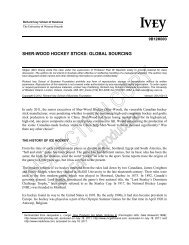foundation of canada asia pacific - Content Tagged with
foundation of canada asia pacific - Content Tagged with
foundation of canada asia pacific - Content Tagged with
You also want an ePaper? Increase the reach of your titles
YUMPU automatically turns print PDFs into web optimized ePapers that Google loves.
emoval. However, most <strong>of</strong> the changes in programs and priorities could be described as<br />
sideways rather than up or down movements, so a change in grade is not warranted.<br />
The final category, tourism, was also hit by the Asian crisis, but is beginning to recover.<br />
Arrivals in the first nine months <strong>of</strong> 1999 were up from the depressed levels <strong>of</strong> 1998,<br />
especially from South Korea, Taiwan and Thailand. The first country is a key source <strong>of</strong><br />
students for ESL schools in Canada, and the much higher tourist arrivals likely reflect a<br />
recovery in the number <strong>of</strong> students arriving on tourist visas for short-term classes. The<br />
number <strong>of</strong> visitors from the all-important Japanese market was also up a little. It is<br />
encouraging that the recovery in tourist arrivals to Canada has been considerably faster<br />
than to the US, although this may reflect the steeper fall in visitors to Canada in 1998.<br />
The goal <strong>of</strong> the Canada Asia Report Card is to highlight how Canada as a nation is<br />
performing in its relationship <strong>with</strong> Asia. Some <strong>of</strong> the areas <strong>of</strong> assessment, like media<br />
coverage or even projection <strong>of</strong> our image, may be outside the influence <strong>of</strong> government<br />
policy. However, those that pertain to economic relations are not. The generally belowaverage<br />
grades point up the lack <strong>of</strong> the concept <strong>of</strong> an overriding “national interest” in<br />
our policymaking toward Asia. Non-interference in business decisionmaking is a<br />
fundamental, and quite proper, policy element <strong>of</strong> the mainstream political parties<br />
supported by the large majority <strong>of</strong> Canadians. However, that does not deny government a<br />
leadership role where interests at stake are greater than those <strong>of</strong> an individual business.<br />
Achieving a greater balance in our international economic relations falls into that category.<br />
Globalization — and some <strong>of</strong> the liberalizations coming in the wake <strong>of</strong> the Asian crisis —<br />
have given Canada the opportunity to diversify its portfolio <strong>of</strong> international assets away<br />
from an over-concentration in the US. Ottawa has a responsibility to guide Canadian<br />
business in this new direction.<br />
19



